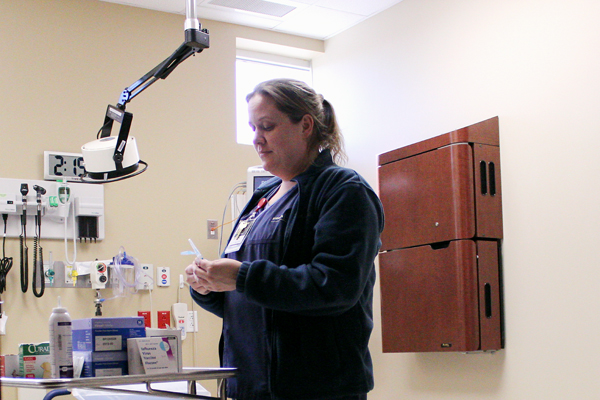With three times the number of flu diagnoses on campus that were reported last year, experts say students should be proactive to prevent sickness and the spread of germs.
Between November and January, University Health Services diagnosed 72 cases of influenza, as opposed to 25 cases diagnosed in the same period last year. As students return to campus, the number of diagnoses is likely to increase, said Theresa Spalding, director of medicine for University Health Services.
Carole Barasch, spokeswoman for the Austin/Travis County Health and Human Services Department, said levels of influenza increased during December.
“What we’re seeing right now is it’s shaping up to be a high-activity flu season,” Barasch said. “We would urge the students, along with the general public, to get a flu shot. If you get sick and just go about doing normal thing, you’re just spreading germs out in the community.”
Spalding said UHS distributed 9,000 of 10,000 flu vaccines last semester to help prevent the spread of the virus during the current peak. Spalding said those vaccines help reduce the spread on campus where people work, eat and live in close proximity.
“We tend to give a lot of the vaccine early to help increase your immunity early,” Spalding said. “When more people are vaccinated, then if a case does appear it gets stopped quicker because the virus doesn’t have anywhere to go to. That’s why we feel it is so effective because we live in such a concentrated environment.”
Spalding said although UHS is still offering flu vaccines by appointments, students should be aware it can take up to two weeks for a vaccine to take full effect. She said it is possible to get sick during that two-week period, although the vaccine should minimize the severity of the flu.
Associate communication studies professor Matthew McGlone released a study in late December in the Journal of Health Communication about the wording of health care information focused on the flu. The study compared how different phrasing about the flu impacted people’s decision to get a vaccine. He said students are more likely to get the vaccine before flu season if they think of the virus as a greater threat.
“The study was about the phrasing of educational information of the flu and what is doing the action: people or the flu,” McGlone said. “If people think of the flu as a predator that can infect them, rather that something that you catch if you’re careless, they are a lot more likely to be scared of it and want to protect themselves from it.”
For the student who has flu-like symptoms, UHS offers resources online at healthyhorns.utexas.edu to help fight the flu, including at-home treatments and a 24-hour nurse hotline. Spalding said students should limit their contact with others, adding that students living in dorms can ask a resident adviser to bring their meals to their room.
“You really need to judge your symptoms and if they’re fairly mild, it’s best to stay at home because you’re most contagious as you’re running a fever,” Spalding said. “Keep your germs to yourself, stay indoors and don’t go to class. We keep stressing to the faculty that if a student is sick and running a fever, they don’t need to be coming to the clinic just to be told they have the flu. [Faculty members] need to trust the student, so they don’t infect their classmates.”
Published on January 14, 2013 as "Vaccines urged after spread of flu".





















